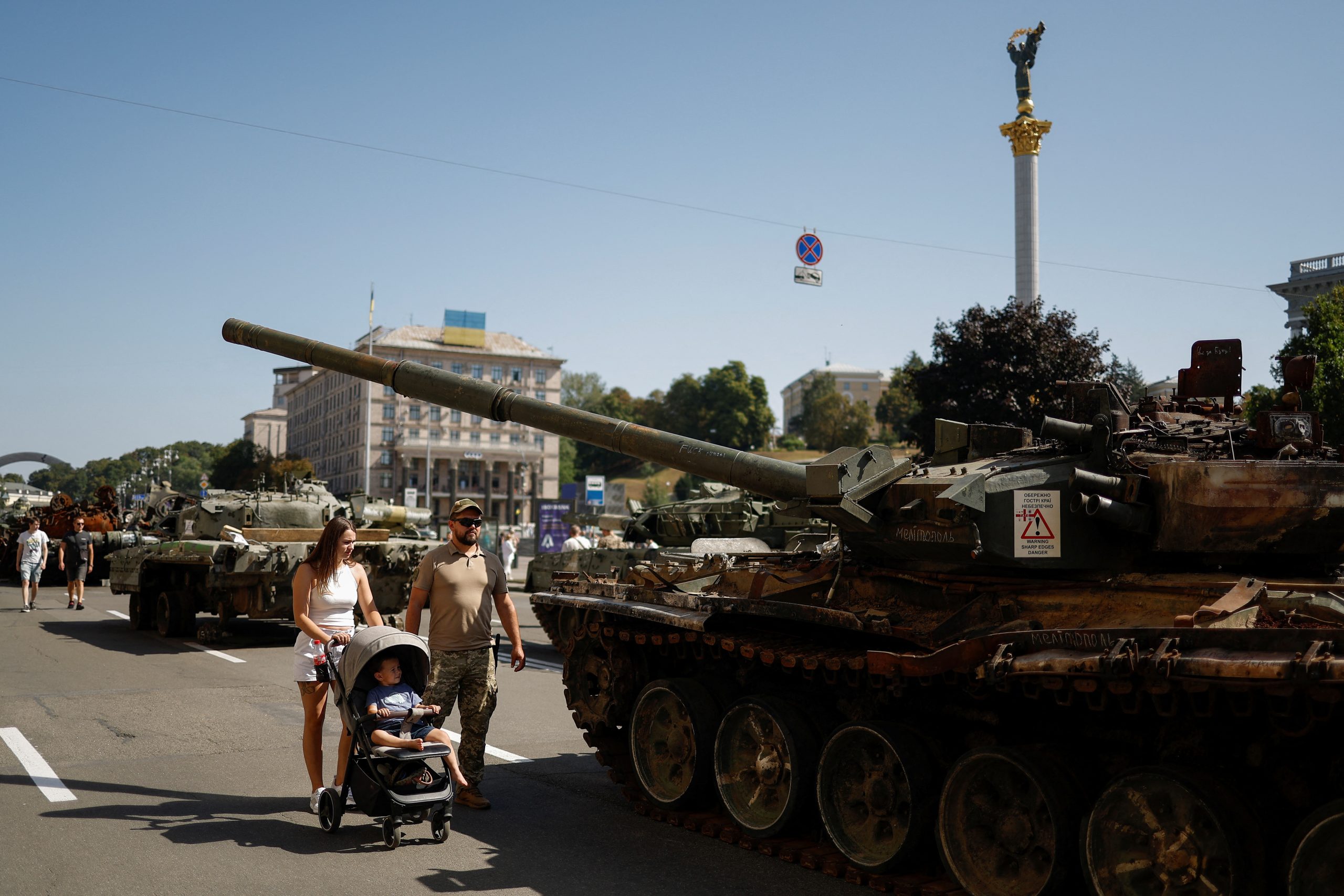
Chris Lange, FISM News
[elfsight_social_share_buttons id=”1″]
Russia’s brutal invasion of Ukraine ground into its sixth month Wednesday on the 31st anniversary of Ukraine’s independence from Soviet rule.
Though the country’s typical commemorative celebrations were canceled amid the ongoing conflict, Ukrainians found a way to mark the anniversary with the unity and defiance that has defined their response to Russia’s invasion as they donned traditional Ukrainian embroidered clothing, Reuters reported.
Dressed in his now-familiar military fatigues, President Volodymyr Zelenskyy gave an emotional speech to his compatriots against the backdrop of Kyiv’s central monument to independence, declaring that Russia’s attack has served to reignite the spirit of Ukraine as he repeated his vow to reclaim Russian-occupied territory.
“A new nation appeared in the world on Feb. 24 at 4 in the morning. It was not born, but reborn. A nation that did not cry, scream or take fright. One that did not flee. Did not give up. And did not forget,” he said.
“We will not sit down at the negotiating table out of fear, with a gun pointed at our heads. For us, the most terrible iron is not missiles, aircraft, and tanks, but shackles. Not trenches, but fetters,” Zelenskyy continued.
He and his wife later attended a religious service in St. Sophia cathedral and laid flowers at a memorial to fallen soldiers.
Ukraine’s western allies marked the anniversary with pledges of additional aid for the war-torn country.
U.S., others continue flood of support to Ukraine
The Pentagon is set to announce another $3 billion in security assistance to Ukraine as soon as today as the war with Russia marks its sixth month. The aid package is being provided under the Ukraine Security Assistance Initiative and is the largest to date.
Unlike previous aid that focused on immediate needs for weapons, the funds are intended to help Ukraine secure a long-term defensive posture, according to U.S. officials who spoke to the Associated Press on condition of anonymity.
The officials also said that the shift in focus on Ukraine’s long-term defense objectives is likely to keep U.S. military troops in Europe into the future to “train and equip Ukrainian forces to fight for years to come,” according to the report. The money will fund contracts for drones and other weapons and equipment for future, rather than immediate, use.
This new focus on Ukraine’s possible future needs, in terms of defense, is a way to show Ukrainian leaders that the U.S. will continue to provide support for Ukraine beyond the immediate conflict, according to the officials
The U.S. has provided about $10.6 billion in military aid to Ukraine since President Biden took office. Nearly 20 packages of weapons supplied to Kyiv were taken directly from Defense Department stocks.
German Chancellor Olaf Scholz, meanwhile, pledged additional defense assistance to the tune of roughly $500 million, while Canadian Prime Minister Justin Trudeau recently gave the green light on a $3.85 million package to shore up Ukraine’s national police force and other emergency services as well as to assist Ukraine’s defense ministry.
NATO Secretary-General Jens Stoltenberg also reaffirmed the alliance’s commitment to continue its support for the war-torn country.
“Winter is coming, and it will be hard, and what we see now is a grinding war of attrition. This is a battle of wills, and a battle of logistics. Therefore, we must sustain our support for Ukraine for the long term, so that Ukraine prevails as a sovereign, independent nation,” Stoltenberg said this week at a virtual conference about the war.
Russia has failed to make much progress in Ukraine in recent months as Ukraine maintains its fierce resistance. Western-supplied weapons, including U.S.-made High Mobility Artillery Rocket Systems (HIMARS) have been used successfully by Ukrainian forces to reclaim some territory in recent weeks.
Meanwhile, a series of recent explosions in Crimea that destroyed Russian warplanes and an ammunition depot threaten Russia’s security in the peninsula it annexed in 2014.
Both sides in the bloody conflict have suffered significant troop losses, while Ukrainian leaders fear the West may soon forget its collective indignation and horror over atrocities and mass civilian casualties allegedly inflicted on Ukrainians by Kremlin forces.
New fears continue to replace former ones on a near-daily basis, leaving little time to grieve or look backward. The U.S. State Dept. this week issued an alert that Russia is planning a major attack on Ukraine’s infrastructure as the U.S. embassy in Kyiv urged Americans to flee the country. Meanwhile, little has been done to abate concerns of a looming nuclear disaster at the Russian-occupied Zaporizhzhia nuclear power station in southeastern Ukraine.
Moscow has repeatedly described its invasion of Ukraine as a “special military operation” to demilitarize Ukraine over what Russia views as its dangerous attachment to the West and the necessity to rid the independent nation of “Nazis.”
